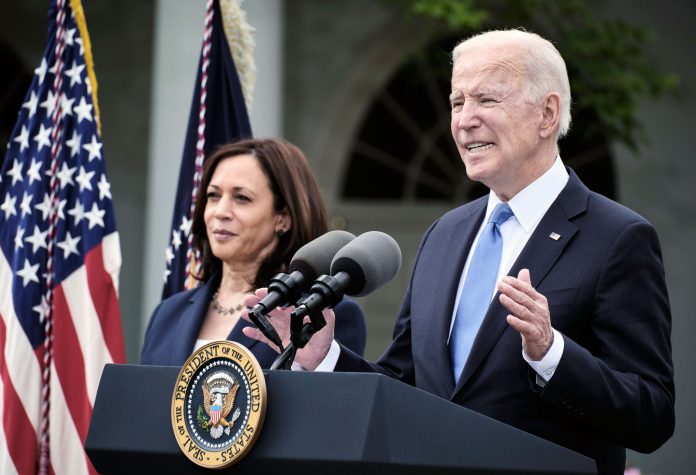
In a sharp turnabout, federal health officials Thursday advised that Americans who are fully vaccinated against the coronavirus may stop wearing masks or maintaining social distance in most indoor and outdoor settings, regardless of size.
The advice from the Centers for Disease Control and Prevention comes as welcome news to Americans who have tired of restrictions and marks a watershed moment in the pandemic. Masks ignited controversy in communities across the United States, symbolizing a bitter partisan divide over approaches to the pandemic and a badge of political affiliation.
Permission to stop using them now offers an incentive to the many millions who are still holding out on vaccination. As of Wednesday, about 154 million people have received at least one dose of a COVID-19 vaccine, but only about one-third of the nation, some 117.6 million people, have been fully vaccinated. Individuals are considered fully vaccinated two weeks after the one-dose Johnson & Johnson shot or the second dose of either Pfizer-BioNTech or Moderna vaccine series.
But the pace has slowed: Providers are administering about 2.16 million doses per day on average, about a 36% decrease from the peak of 3.38 million reported in mid-April.
“We have all longed for this moment,” Dr. Rochelle Walensky, the CDC director, said at a White House news conference Thursday. “If you are fully vaccinated, you can start doing the things that you had stopped doing because of the pandemic.”
The new advice comes with caveats. Even vaccinated individuals must cover their faces and physically distance when going to doctors, hospitals or long-term care facilities like nursing homes; when traveling by bus, plane, train or other modes of public transportation, or while in transportation hubs like airports and bus stations; and when in prisons, jails or homeless shelters.
Walensky warned that unexpected twists in the pandemic could require the CDC to once again amend the guidance. Fully vaccinated people who develop symptoms should still use masks and get tested, she said.
Asked how the new guidance might apply to businesses and schools, she said that the agency was working to issue new recommendations soon for specific settings, including for summer camps and travel, which would be published soon.
In deference to local authorities, the CDC said vaccinated Americans must continue to abide by existing state, local or tribal laws and regulations and follow local rules for businesses and workplaces.
Still, the changes are likely to galvanize Americans who have become unaccustomed to appearing in public unmasked — or to seeing others do so.
“We’ve got to liberalize the restrictions so people can feel like they’re getting back to some normalcy,” Dr. Anthony Fauci, the Biden administration’s senior adviser on the pandemic, said in an interview. “Pulling back restrictions on indoor masks is an important step in the right direction.
“You can’t inhibit people from doing the things they want to do, which is one of the reasons they wanted to get vaccinated in the first place, because other people are not getting vaccinated,” he added.
The move could raise alarms among more cautious Americans, who may be more reluctant to engage in public activities when more people are unmasked. There is no way to know who is vaccinated and who is not, and the majority of the population is not yet fully vaccinated. Walensky added that immunocompromised people who have been fully vaccinated should consult their physicians before relinquishing a face mask.
“For those who are more risk-averse, you have a choice of continuing to wear it if you want to,” Fauci said.
At the White House news conference, Fauci encouraged Americans, some who may still be gradually adjusting to a new normal after more than a year of living through the pandemic, not to be self-conscious if they do not immediately forgo masks.
“There’s absolutely nothing wrong with an individual who has a certain level for risk aversion,” he said. “They shouldn’t be criticized.”
Walensky defended the timing of the new mask guidance, pointing to a steep drop in coronavirus cases, which have dropped by about a third in the last two weeks, and a sustained increase in supply of vaccines.
The new recommendations arrived just two days after Senate Republicans tore into the CDC for what they labeled outdated and overly conservative guidance on mask-wearing, accusing the agency at a hearing on the government’s pandemic response of losing the trust of Americans looking to return to normal life.
Agency officials pointed to several recent studies showing that vaccines are more than 90% effective at preventing mild and severe disease, hospitalizations and deaths from COVID-19 in real-world settings.
Among them was a study of 6,710 health care workers in Israel, including 5,517 fully vaccinated workers, that found the Pfizer vaccine was 97% effective at preventing symptomatic infections among the fully vaccinated, and 86% effective at preventing asymptomatic infections among them. (Vaccination rates in Israel are far higher than in the United States, however.)
The CDC also emphasized that vaccines in use have also proven effective against variants of the coronavirus that are circulating in the United States.
The CDC has been under fire recently for moving too gingerly to lift restrictions on public activities for those who are vaccinated. Some critics have said the agency’s caution may suggest to Americans that officials lack confidence in the vaccines.
Allowing immunized people to go mask-free indoors may help persuade more people to opt for the vaccine, said Angela Rasmussen, a virus expert at Vaccine and Infectious Diseases Organization in Saskatchewan. Removing mask requirements “is another incentive that is extremely low-cost and is very much supported by evidence.”
Although the CDC historically has been one of the most trusted public health agencies in the world, public confidence in its recommendations lagged during the Trump administration, which sought to muzzle government experts and alter the agency’s advice, and has not fully rebounded.
Only half of Americans said that they had a “great deal” of trust in the CDC, according to a new survey conducted in February and March by the Robert Wood Johnson Foundation and the Harvard T.H. Chan School of Public Health.
Copyright 2021 The New York Times Company













